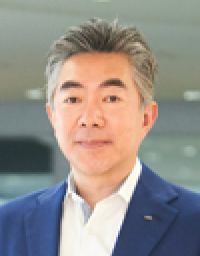Message from IPSJ President
Message from IPSJ President
Creation of New Values in the Post-Colona Era
-- Upon assuming the IPSJ President --

I am honored to succeed former President Dr. Tokuda as the 32nd President of the Information Processing Society of Japan (IPSJ). I would like to work together with all of you to promote our activities more actively, and I would like to seek for all of your help to achieve it. I also would like to take this opportunity to express my sincere respect for the efforts made by the past presidents, executives, members, and secretariat members who have been dedicated to the development of the Society for over six decades.
Toward Post-Corona Era
Increasing Interest in Information Technology
In light of this trend, there has been an increased demand for cutting-edge technology in the development and mass production of advanced logic semiconductors in Japan, the United States, and Europe. Consequently, each country has started to inject significant government funding to support these endeavors. In Japan, following TSMC's construction of a new plant in Kumamoto, a new corporation named Rapidus was established in December last year under the framework of the Japan-U.S. partnership to start to rebuild the advanced semiconductor production capability in Japan. In the field of quantum computing, Keio University established a research hub in 2018 to promote industry-academia collaboration, utilizing IBM's cloud services for quantum computers. This collaborative effort later expanded into a larger consortium called the “Quantum Innovation Initiative Consortium (QIIC)”, with the University of Tokyo taking the lead. In 2021, the QIIC initiated to acquire IBM's gate-type quantum computer to be installed in Shin-Kawasaki, aiming to further enhance its research activities with the partner companies. Moreover, Japan’s domestic team achieved notable progress as well. RIKEN successfully launched its first operational quantum computer in March this year.
Indeed, there have been multiple initiatives to investigate technological innovation in the field of information technology, driven by the advancements in computer hardware. The current landscape is characterized by a convergence of social demand stemming from the widespread adoption of large-scale AI and breakthroughs in fundamental technologies such as semiconductors and quantum computers. The combination of factors has created an environment where there is a pressing need to address the challenges and opportunities arising from these advancements.
The emergence of geopolitical risks and the role of open academic organizations
In such a complex and interconnected world, the role of open academic organizations become more and more crucial. These organizations have the potential to foster collaboration, knowledge sharing, and understanding among nations and cultures. By promoting open dialogue, research and education, academic institutions can contribute more to address to many more challenges in the world we have today.
Open academic organizations such as IPSJ provide platforms of broad research fields for scholars, researchers and students from different countries and background to come together, exchange ideas and work towards common goals. Their emphasis on inclusivity, diversity and openness helps break down barriers, overcome biases and build bridges between nations as well. By nurturing a culture of mutual respect, cooperation, and understanding, these organizations can play a vital role in peaceful and sustainable world. In fact, some advanced technology areas move faster in the industry, and such an active and open collaboration will help accelerate the field of research and the advancement of the entire field and adoption to the society.
In my new role at IPSJ, I am committed to further promoting an open and diverse collaborative environment and creating new value for both the community and society as a whole. This entails integrating knowledge from various academic fields to foster innovation and advancements.
To achieve this, it is crucial to encourage active participation from researchers and engineers with diverse backgrounds, experiences, and expertise. Facilitating talent exchanges and international collaborations that transcend generational and industry boundaries is also important. Additionally, I am dedicated to actively engaging and supporting students and young researchers, including through initiative such as the junior membership system that we established in 2015.
I am eagerly looking forward to collaborating with all of you to realize these visions and contribute to the growth and development of IPSJ. Together, we can create a vibrant and inclusive community that drives positive change and meaningful contributions to society.
